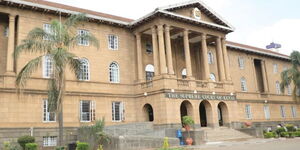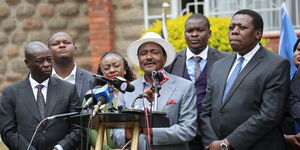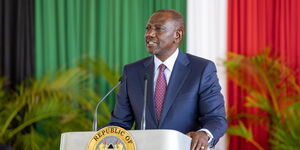In recent weeks, it has been a game of tug of war between Kenya Kwanza and Azimio la Umoja in Parliament, with each party contending to land on the majority side of the House.
On October 6, 2022, after the general election, National Assembly Speaker Moses Wetang'ula declared the Kenya Kwanza Coalition the majority party.
Wetang'ula's decision back then to name Kenya Kwanza as the majority side was recently opposed on February 7, 2025, by the Kenyan High Court, which termed it null and void, noting that the Speaker had no justifiable basis for reassigning 14 members from various parties to Kenya Kwanza.
Wetang'ula, however, surfaced and cemented that Kenya Kwanza remains the majority party with 165 MPs, while Azimio remains the minority party with 154 MPs.
"Arising from the foregoing, Kenya Kwanza is the majority, and Azimio is the minority. The leadership of the House remains unchanged," he said.
Wetang'ula's declaration this month has faced pushback from the Azimio side, who have, for the past two years, opposed Kenya Kwanza's supremacy in the House. You might wonder: why is being declared the majority in the National Assembly such a big deal?
So, here is why being the Majority and Minority in Parliament is a big deal:
Parliament is a legislative, elected body of government tasked with representing the electorate, making laws, authorising government expenditure, scrutinising activities of government ministries, departments, and agencies, and providing a forum for debate on national issues.
Political parties in Parliament are responsible for exercising power, either by supporting the government or opposing it. They are divided into two: the Majority and Minority sides, depending on the number of members on each side.
Some of the key functions of the Majority side, which consists of more members, include forming the government, proposing and passing legislation, setting the legislative agenda, making leadership and committee appointments, and defending the government's policy.
The Minority side, on the other hand, which consists of fewer members, is responsible for scrutinizing government policies and legislation, providing checks and balances, and holding the government accountable for its actions, especially in areas like budgeting, public expenditures, and oversight of state agencies.
This means that the Majority side has a slight advantage in accomplishing its political mandate in the House compared to the Minority.
Each side has a leader, as provided by Article 108 of the Constitution. The leader of the Majority is responsible for functions such as planning daily, weekly, and annual legislative agendas, while the Minority Leader is tasked with developing and championing the Minority position on issues and debates of the Minority party.
On Tuesday, February 18, speaking in an interview with Citizen TV, Kitui Central Member of Parliament Makali Mulu further revealed that having the Majority and Minority is a key determinant of which side steers which committees in the House.
According to Mulu, the Majority in Parliament is tasked with chairing the majority of the committees, while the Minority side chairs "watchdog" or oversight committees, which are fewer in number.
"Immediately you are declared to be the Minority, you have very few committees to chair, but once you are told you are the Majority, even first-timers can chair committees," he said.
"It is dishonest to Kenyans to start mixing that you are in the Minority, and you are taking committees meant for the Majority. If it is determined that Azimio is the Majority, can they take all the committees that are supposed to be chaired by the Majority? And if Kenya Kwanza is the Minority, can they take the committees meant to be chaired by the Minority, which are the watchdogs?" he added.
A committee is a small group of members appointed and empowered by the House to perform one or more specific tasks.
In the Kenyan National Assembly, committees are tasked with reviewing legislation, reviewing and approving the budget and expenditures, scrutinising government programmes, policy frameworks, and development plans, conducting investigations on special issues, vetting and approving executive appointments, and providing a platform for public participation, among others.












